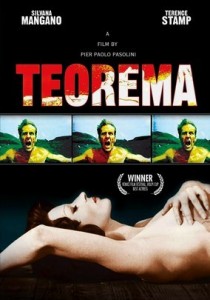Teorema-1968
Director Pier Paolo Pasolini
Starring Terence Stamp, Silvana Mangano
Scott’s Review #234
Reviewed April 10, 2015
Grade: A-
Teorema is a 1968 Italian art film directed by Pier Paolo Pasolini, who later went on to direct the dark and disturbing 1975 masterpiece, Salò- 120 Days of Sodom.
If one is looking for a concise, mainstream plot with a fixed, to-the-point beginning and ending, one will be disappointed. Rather, Teorema is an exhibition in artistic style and interpretation, and it succeeds in mesmerizing this viewer with thought and contemplation.
A mysterious stranger, known as “the visitor”, suddenly arrives to stay with an affluent Italian family in their sprawling estate. The family consists of a father, mother, son, daughter, and maid, all of whom experience loneliness, boredom, fear, rage, or repression.
The handsome stranger successfully beds all the family members, and just as suddenly as he arrives, he disappears from the household, leaving the family members with different thoughts, feelings, and actions upon his departure.
The film is highly interpretive, and every character can be analyzed.
The stranger seduces all the characters, and the family’s wealth is examined. Is Teorema (which translates to the theorem in Italian) a commentary on the bourgeois society? The father, Paolo, owns a factory and appears to be in turmoil- is he a repressed homosexual?
The father’s story concludes with him turning his factory over to the workers, stripping naked, and roaring with anger and frustration.
Is the mother simply a wealthy, bored housewife or much more than that? This character might have been explored more thoroughly.
The maid, devoutly religious, becomes suicidal after her tryst with the stranger. The others confide in the stranger about how they feel about themselves, and at times, the film feels like a therapy session as each character delves deeper into their personal feelings.
Only the maid is a bit different from the others, but could this be because she is working-class, while the others are affluent?
The daughter, Odessa, approximately sixteen years old, becomes depressed after her liaison. The frightened, weak son appears to have a crisis and is consoled by the stranger in a loving, tender fashion.
Interestingly, the film at the time was resoundingly denounced by the Vatican, which took offense at the controversial tone of the film and its focus on “obscenity”.
Could this be because of some people’s interpretation of “the visitor” as being a Christ-like figure? One must argue for the distinction between “obscenity” and “art” after viewing this groundbreaking, visionary film. I found Teorema to be a thought-provoking film and did not feel the movie was going for shock value.
The film is lightweight in this regard compared to the hauntingly brutal Salo (1975), which followed years later.
Teorema (1968) delves into the psychological abyss and portrays an Italian family as more than wealthy- they are people with emotions, fears, desires, and complexities.
Not for mainstream audiences, but meant for lovers of interpretive film, it can be debated and discussed for ages to come.
